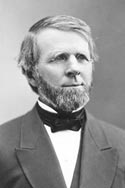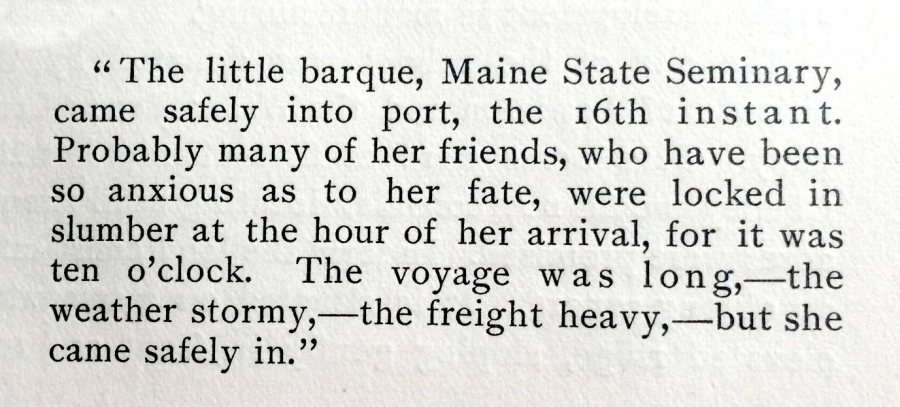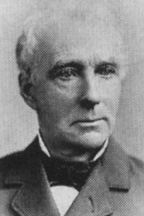March 16, 1855: Maine State Seminary wins its charter

On March 16, 1855, after tortuous machinations in the Maine Legislature, Gov. Anson Morrill signed “An Act to Incorporate the Trustees of the Maine State Seminary” (the school from which Bates evolved, in 1864).
The bill passed the House at 8:15 p.m. and the Senate at 9:30 on the session’s final day, after which founder Oren Cheney walked the document posthaste to the governor’s office.
“Have you a bill there you want me to veto?”
“Well, Mr. Cheney, have you a bill there you want me to veto?” the governor teased. “Yes, Governor, if you want to!” Cheney replied.
As the governor put pen to paper, Cheney wrote later, “a burden was rolled off, and a winter’s work was ended.”
The seminary charter was one of 216 acts that the Legislature passed in its 76-day session and far from its simplest. “The voyage was long — the weather stormy — the freight heavy — but she came safe in,” Cheney wrote in The Morning Star.

Traditionally Maine gave land to help a newly incorporated “literary institution.” But as the Maine State Seminary bill came up for discussion, the Legislature debated that practice and ultimately veered away from it, deciding instead to endow new schools with money rather than land.
But to Cheney’s consternation, his bill was reported from the Education Committee without land or money. “But we were in the hands of our friends, and we could not help ourselves,” Cheney wrote.
At the same time, the Legislature debated an omnibus bill featuring $60,000 of appropriations to five schools, including the Maine State Seminary.
But the omnibus bill was pure subterfuge, an attempt to “kill the whole thing,” according to The Life-Story of O.B. Cheney. “After long discussion the omnibus bill was defeated, for the members knew well that they would not be sustained by their constituents in voting for education so large a sum of money.”
“Children need education, in order to become valuable citizens.”
Cheney persevered in his lobbying, with a simple message: “There are many Free Baptists in Maine whose children need education, in order to become valuable citizens.” Through his efforts, funding was restored to the bill ($5,000 in cash for the seminary, and $10,000 in scrip from which the seminary would earn 6 percent interest for 20 years).
To win the day, Cheney quite literally had to outlast the opposition, remaining in Augusta (where he lived) until after presidents of the other literary institutions seeking funds had left town.
He saw the bill survive opposition on the grounds that no literary institutions should receive state funding. He saw it survive a vote to delay to the next session. And he saw it survive other attempts to amend it to death.
On the last day of the session, Cheney still had a daunting task: convince Senate leaders to take up the House version of the bill and reconcile any differences. The following, from The Life-Story of O.B. Cheney: is Cheney’s account of the bill’s last few hours:
As the session was nearing its close, I called upon the Chairman of the Joint Committee, and asked him if, at a suitable time, he would call up the bill for action in the Senate. He said it would be of no use. As the bill was in his hands, it was not easy to know what to do next, but I found a friend of the measure who agreed, that, if the Chairman continued to refuse to report the bill, he would call upon him to do so from the floor of the Senate, and, if he then declined, he would himself call it up on the last day of the session…..
Besides the Chairman of the Committee, there was one other Senator…who had earnestly opposed the bill. At noon I obtained an audience with him. I told him that, when I was a member of the Legislature, I voted to help all the schools, including the one in which he was interested. I reminded him that but a few hours remained before the close of the session and begged of him, as a personal favor, that, if the bill was brought up, he would not offer an amendment. He finally promised….
When the Senate was called to order in the afternoon, I went right to the Chairman and asked him to call up the bill. He said, “It will be of no use, Mr. Cheney. It will not pass.” I said, “Call it up and let us see.”
He was he would, if I would allow him to make an amendment, giving to the school which he represented $7,000 and to Maine State Seminary $8,000. I replied that that would send it back to the House and defeat everything for that session. When he found that, if he did not report the bill, some one else would call for it, he yielded and it was soon before the Senate….
After one more stumble — the bill’s final language included a mistake, forcing Cheney to have it reprinted for its final vote — the legislation passed the House and the Senate.
I asked if, instead of sending by a committee, as usual, I might, in person, take it to the Governor. [The presiding officer of the Senate] gave the permission. It was ten o’clock. The session closed at twelve. As I entered the room of the Governor, Hon. Anson P. Morrill, he looked up from the bills he was signing and smilingly said, “Well, Mr. Cheney, have you a bill there you want me to veto?” I replied, “Yes, Governor, if you want to!” He promptly affixed his signature and I went home and went to sleep with the happiest heart I had in years.

To access the state-awarded funds, however, Cheney had to raise $15,000 in private funds, and the trustees’ decision to locate the Maine State Seminary in Lewiston was in large part driven by money.
The school’s location, the trustees decreed, should be a place of appropriate size and economic health; it should offer “freedom from immoralities,” in the words of Bates and Its Background, as well as “observance of the ‘Maine Law’ [prohibition]” and a healthy population of churches and Free Baptists.
One last condition would be a deal-maker for Lewiston: “the amount of money and land which the place would pledge to the institution.”
One of Lewiston’s leading citizens, Alonzo Garcelon, made pitch for Lewiston. Besides pointing out its thriving manufacturing economy and enterprising newspaper, and its attraction to “Boston capitalists” (including one Benjamin Bates), Garcelon offered, on behalf of Lewiston, 20 acres and an outright gift of $10,000 cash, an amount double what was initially proposed.
A member of the Senate, Garcelon had voted for the seminary. “In a sense it was his child,” according to Bates and Its Background. “He knew all about it; he had set his heart on its coming to the city….”